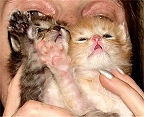Unlike most mammals, cats—both domestic and wild—are indifferent to sweets. In a new study, researchers say they have learned why.
The taste buds of mammals bear complexes of molecules designed for sensing specific flavors, called receptors. “Sweet” receptors consist of two protein molecules hooked together, said Joseph Brand, senior author of the study and associate director of the Monell Chemical Senses Center in Philadelphia, Penn.
Brand and his co-researchers said cats don’t produce one of the proteins, because the gene that codes for its production doesn’t work in cats.
The gene probably lost its functionality because it has no use given the felines’ carnivorous behavior, the researchers said.
“We took a behavioral question and answered it molecularly,” Brand said.
Cats can’t recognize any carbohydrates, a class of substances that includes sugars, according to Brand. They therefore eat a meat-and-fat only diet similar to the “Atkins” diet popular in the United States.
The findings raise key evolutionary questions, Brand noted. One is “when and why did cats lose the ability to taste sweet things?” Another is a chicken-and-egg question: “Which came first, the carnivorous behavior or the inability to taste sweets?”
Brand added, “I said jokingly, no wonder cats are cranky—not only do they have to hunt for their food, but they also can’t enjoy a sweet dessert!”
The study is published in the July 25 issue of the research journal PLoS Genetics.

